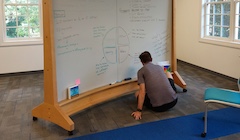Expressions of Trust: How University STEM Teachers Describe the Role of Trust in their Teaching
DOI:
https://doi.org/10.20343/teachlearninqu.12.22Keywords:
trust, university teaching, trust-building, STEM teachingAbstract
Positive teacher-student and student-student relationships are among the most significant factors contributing to learning, motivation, wellbeing, and graduation rates in higher education. Trust is commonly understood as a key element for the development and sustenance of positive educational relationships, yet relatively little empirical research investigates trust in higher education classrooms. In this study, we explore how science, technology, engineering and mathematics (STEM) teachers (n=29) from universities in four countries (Canada, New Zealand, Sweden, and USA) describe their intentions and actions related to trust in one of the large enrollment courses they teach. We consider the ways that teachers understand and value trust in their teaching, and what this might suggest about how they approach trust-building with and among their students. We report on four broad approaches to trust expressed by teachers in this study, framed as teacher statements to students: “trust me,” “trust yourself,” “trust each other,” and “I trust you.” This research has implications for teachers, SoTL scholars, and academic developers in higher education.
Read the corresponding ISSOTL blog post here.
References
Amzalag, Meital, Noa Shapira, and Niva Dolev. 2022. “Two Sides of the Coin: Lack of Academic Integrity in Exams during the Corona Pandemic, Students’ and Lecturers’ Perceptions.” Journal of Academic Ethics 20: 243–63. https://doi.org/10.1007/s10805-021-09413-5. DOI: https://doi.org/10.1007/s10805-021-09413-5
Aragón, Oriana R., Sarah L. Eddy, and Mark J. Graham. 2018. “Faculty Beliefs About Intelligence Are Related to the Adoption of Active-Learning Practices.” CBE—Life Sciences Education 17 (3). https://doi.org/10.1187/cbe.17-05-0084. DOI: https://doi.org/10.1187/cbe.17-05-0084
Bovill, Catherine. 2020. “Co-Creation in Learning and Teaching: The Case for a Whole-Class Approach in Higher Education.” Higher Education 79 (6): 1023–37. https://doi.org/10.1007/s10734-019-00453-w. DOI: https://doi.org/10.1007/s10734-019-00453-w
Chew, Stephen L., and William J. Cerbin. 2021. “The Cognitive Challenges of Effective Teaching.” The Journal of Economic Education 52 (1): 17–40. https://doi.org/10.1080/00220485.2020.1845266. DOI: https://doi.org/10.1080/00220485.2020.1845266
Cook-Sather, Alison, Catherine Bovill, and Peter Felten. 2014. Engaging Students as Partners in Learning and Teaching: A Guide for Faculty. San Francisco: Jossey-Bass.
Felten, Peter, Rachel Forsyth, and Kathryn Sutherland. 2023. “Building Trust in the Classroom: A Conceptual Model for Teachers, Scholars, and Academic Developers in Higher Education.” Teaching & Learning Inquiry 11. https://journalhosting.ucalgary.ca/index.php/TLI/article/view/77047. DOI: https://doi.org/10.20343/teachlearninqu.11.20
Garrison, D. Randy, Terry Anderson, and Walter Archer. 1999. “Critical Inquiry in a Text-Based Environment: Computer Conferencing in Higher Education.” The Internet and Higher Education 2 (2): 87–105. https://doi.org/https://doi.org/10.1016/S1096-7516(00)00016-6. DOI: https://doi.org/10.1016/S1096-7516(00)00016-6
Healey, Mick, Abbi Flint, and Kathy Harrington. 2016. “Students as Partners: Reflections on a Conceptual Model.” Teaching & Learning Inquiry 4 (2): 8–20. https://doi.org/10.20343/teachlearninqu.4.2.3. DOI: https://doi.org/10.20343/teachlearninqu.4.2.3
Jones, Gareth R., and Jennifer M. George. 1998. “The Experience and Evolution of Trust: Implications for Cooperation and Teamwork.” The Academy of Management Review 23 (3): 531–46. https://doi.org/10.2307/259293. DOI: https://doi.org/10.2307/259293
Krueger, Frank, and Andreas Meyer-Lindenberg. 2019. “Toward a Model of Interpersonal Trust Drawn from Neuroscience, Psychology, and Economics.” Trends in Neurosciences 42 (2): 92–101. https://doi.org/10.1016/j.tins.2018.10.004. DOI: https://doi.org/10.1016/j.tins.2018.10.004
Ludema, James D., David L. Cooperrider, and Frank J. Barrett. 2006. “Appreciative Inquiry: The Power of the Unconditional Positive Question.” In Handbook of Action Research, 155–65.
Mayer, Roger C., James H. Davis, and F. David Schoorman. 1995. “An Integrative Model of Organizational Trust.” The Academy of Management Review 20 (3): 709–34. https://doi.org/10.2307/258792. DOI: https://doi.org/10.5465/amr.1995.9508080335
Payne, Ameena L., Cathy Stone, and Rebecca Bennett. 2022. “Conceptualising and Building Trust to Enhance the Engagement and Achievement of Under-Served Students.” The Journal of Continuing Higher Education 71 (2): 1–18. https://doi.org/10.1080/07377363.2021.2005759. DOI: https://doi.org/10.1080/07377363.2021.2005759
Peseta, Tai, Jenny Pizzica, Ashley Beathe, Chinnu Jose, Racquel Lynch, Marisse Manthos, Kathy Nguyen, and Hassan Raza. 2020. “A Partnership Mindset: Students as Partners in and Beyond the Academy.” In The Power of Partnership: Students, Staff, and Faculty Revolutionizing Higher Education, edited by Lucy Mercer-Mapstone and Sophia Abbot, 107–17. Elon, North Carolina: Elon University Center for Engaged Learning. DOI: https://doi.org/10.36284/celelon.oa2.6
Roxå, Torgny, and Katarina Mårtensson. 2009. “Significant Conversations and Significant Networks–Exploring the Backstage of the Teaching Arena.” Studies in Higher Education 34 (5): 547–59. https://doi.org/10.1080/03075070802597200. DOI: https://doi.org/10.1080/03075070802597200
Schon, Donald A. 1984. The Reflective Practitioner: How Professionals Think in Action. New York: Basic Books.

Downloads
Published
Issue
Section
License
Copyright (c) 2024 Kathryn A. Sutherland, Rachel Forsyth, Peter Felten

This work is licensed under a Creative Commons Attribution-NonCommercial 4.0 International License.






